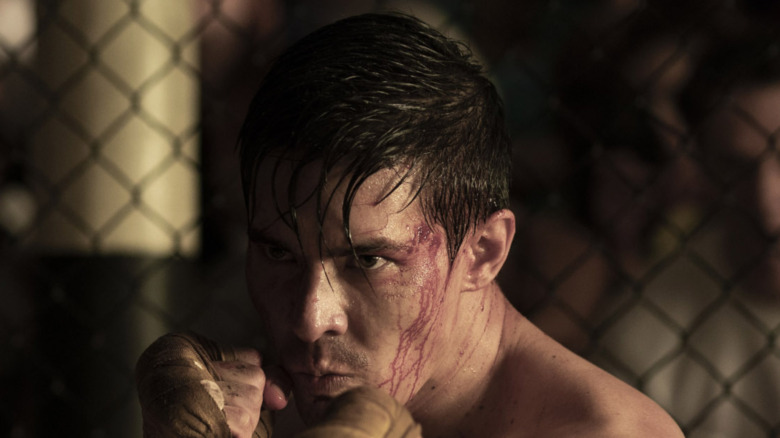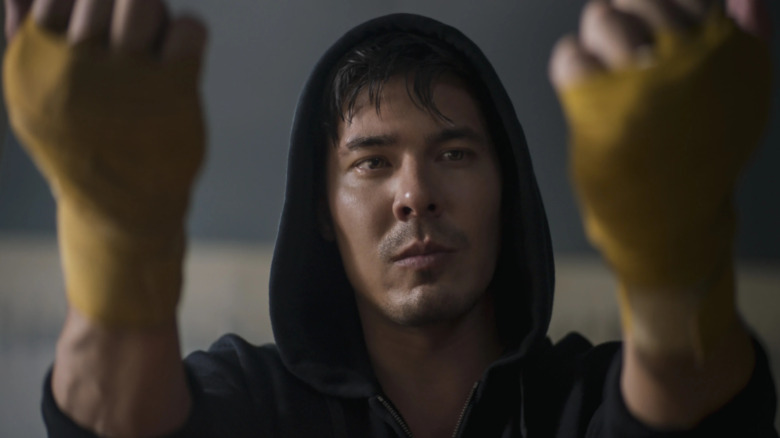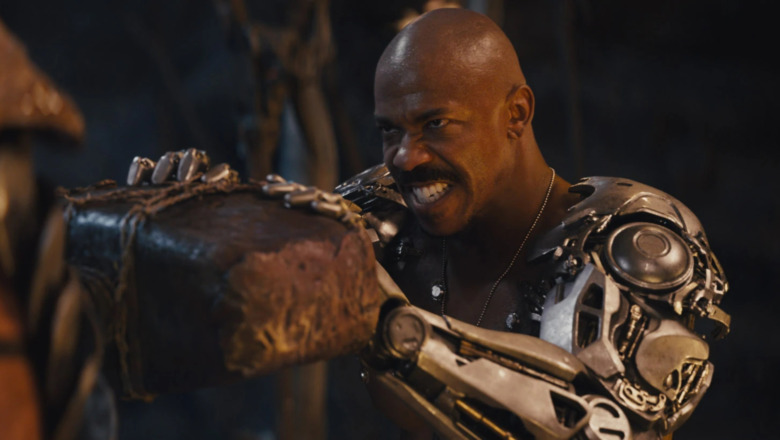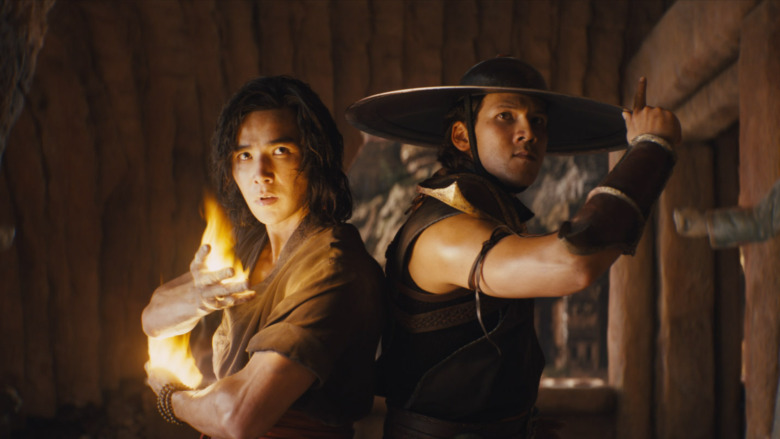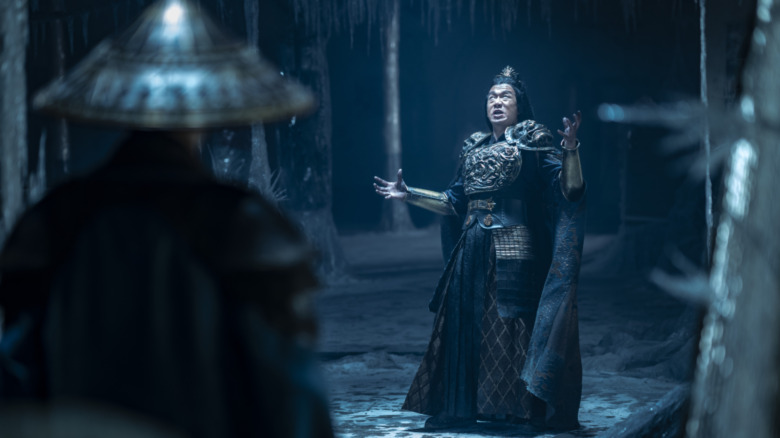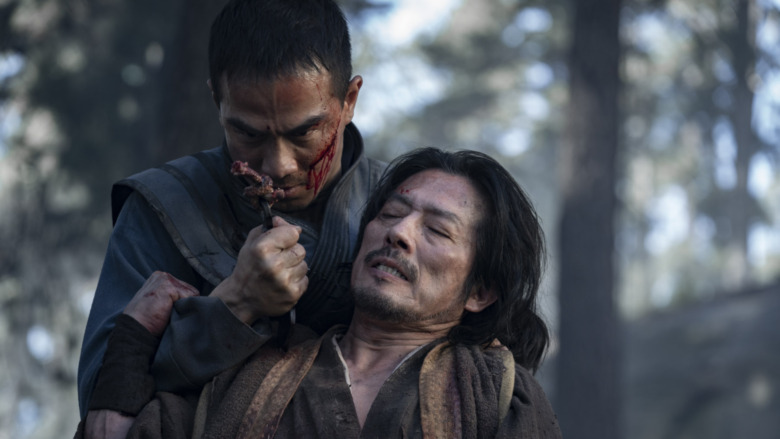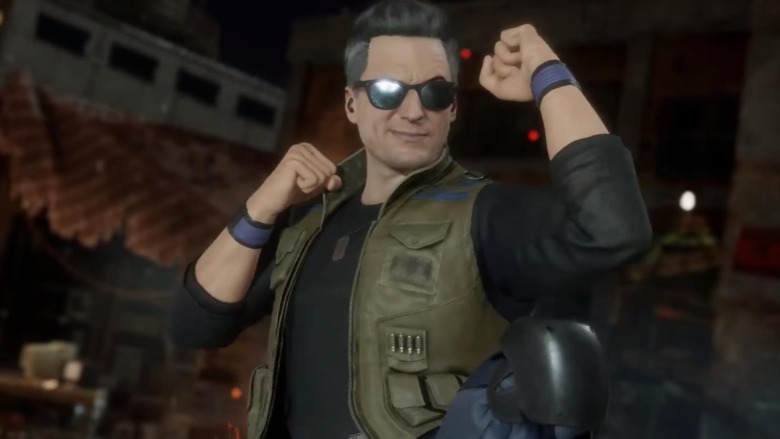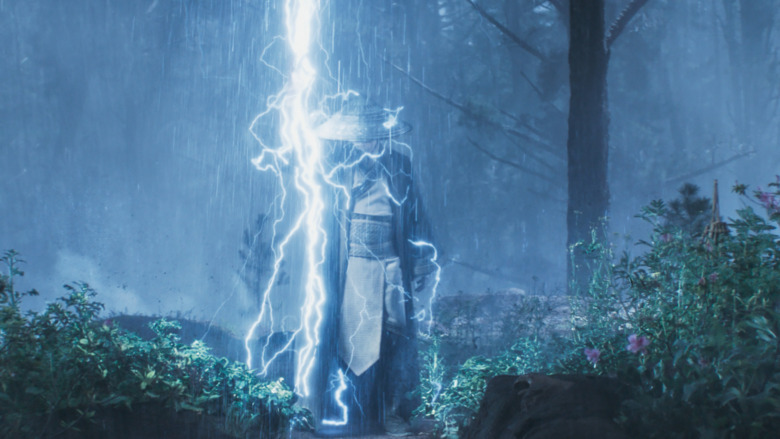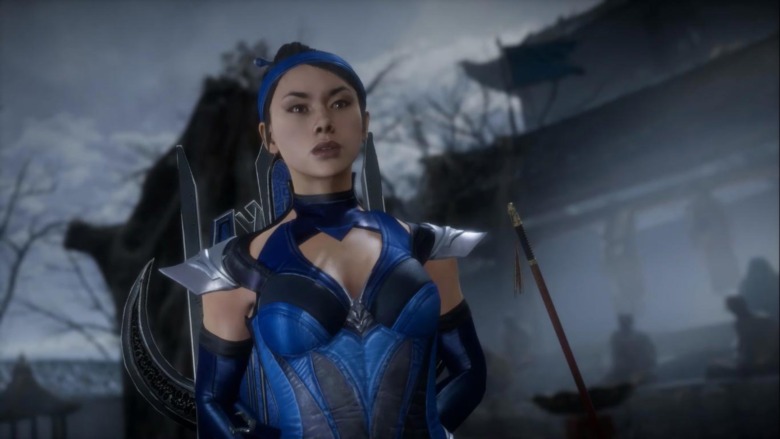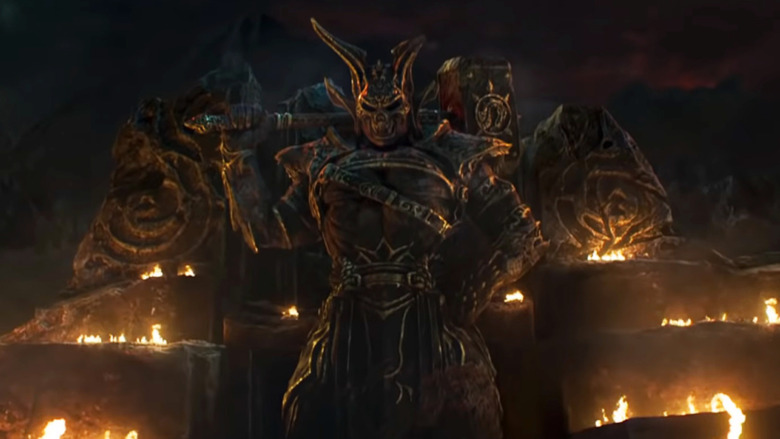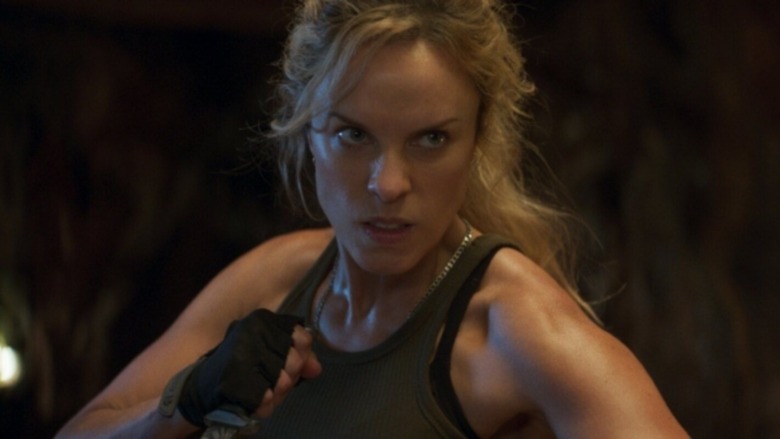The End Of Mortal Kombat Explained
It took years of development with more than a few delays along the way, but "Mortal Kombat" — the 2021 feature film re-imagining of the classic fighting game series — seems to have been worth the long wait. The film debuted in the spring of 2021 to enthusiastic responses from genre critics as well as fans who were eager to devour a fresh take on the franchise that walks the line between invention and devotion to the long-running gaming staple.
"Mortal Kombat" emerges as a standalone film filled with lots of exposition to keep newcomers engaged in the material, while also packing its narrative with nods to the long-term mythos of the video game series. At the same time, it's also a film meant to set up an entirely new big-screen franchise, and that means its final act is chock full of set-up, meaning, and possibility paving the way for at least one sequel to come, if not several. With that in mind, we're here to unpack all of it. This is the ending of 2021's "Mortal Kombat," explained.
Spoilers for all of "Mortal Kombat" below!
A champion rises
By choosing Cole Young as the central character and key point of view in its narrative, the 2021 "Mortal Kombat" movie gives viewers an opportunity to view the vast mythology of the story and the games that inspired it in a new way, because Cole is portrayed from the start as a born underdog. He's famously good at taking a punch, and while that ability has never served him all that well in his normal life, once his arcana is activated it becomes, quite literally, a super power.
The significance of Cole's power goes beyond the mere metaphor of the kinetic armor that comes with it, though. As the last descendant of an ancient bloodline thought to have been destroyed centuries before the start of the film, he is the living embodiment of human endurance and perseverance, a man who will not be kept down even when a near-immortal ninja monster tries to murder him for it. It's a powerful statement that forms the heart of the film, particularly when we consider Cole's life as a family man: When our backs are to the wall, human beings do not give up.
Because Cole is an original character not reflected in any of the "Mortal Kombat" games, this message not only hits home with more resonance, but also provides a solid foundation on which the film can build out into a whole franchise. It is, fundamentally, the story of an ordinary guy just trying to keep taking hits proving that he can use that unshakeable spirit to literally save the world.
Warriors prove themselves
Cole is an ordinary guy who finds that his particular skills serve him well in extraordinary circumstances. In contrast, his Earthrealm comrades Sonya and Jax are introduced in the 2021 "Mortal Kombat" movie as extraordinary people who spend the whole film proving they belong. Cole is reluctant to embrace the danger of the Mortal Kombat tournament, but Sonya and Jax have spent years embracing it, running toward it, desperate not just to understand the fight but to make sure it's won. Then they're thrown into the deep end as Outworld closes in, and both have to prove they deserve to be there.
For Jax, that means a journey back from the brink of death, a battle against his own spirit to unlock his arcana and prove that his strength is about more than just physical prowess. Jax ends the film with super-powered cybernetic arms, but he would never have gotten there if his courage hadn't overcome every obstacle. Then there's Sonya, the champion who never got the mark of a champion but wants to be part of the fight anyway, because she feels a duty to those she's lost as well as those who are still alive to fight beside her. In the end, by defeating Kano, she earns that mark, proves she's meant to be there, and becomes a powerful asset in the fight that's still to come. These two warriors start this particular journey from a place of extraordinary courage and insight, and they push beyond that to end the journey as legends.
The restoration of hope
For most of the champions of Earthrealm, this "Mortal Kombat" story is essentially a journey to understanding and belonging as they come to grips with the fight they've been thrust into. For Raiden and Liu Kang, who've been in the fight for a very long time, it's a journey to trusting in humanity again, and making sacrifices along the way.
Lord Raiden has been a part of the war between realms since time immemorial, and it's clear from his position early on in the film that he's lost his way a bit. He's sick of struggling, sick of losing, and sick of the underhanded tactics used by Shang Tsung and the Outworld champions, but he doesn't seem to know if he can ever overcome any of that. Raiden is brought low and nearly defeated, and his eventual victory comes not from his own trust in the traditions of the tournament, but from trusting in his new Earthrealm champions. Because of that, by the end of the film, he's filled with hope.
Likewise, Liu Kang takes a similar journey from desperation to hope. The bright, flame-wielding warrior clearly always wanted to lead the charge for Earthrealm with his adoptive brother Kung Lao at his side, but in one of the film's most emotional scenes, Kung Lao is taken out of the fight. Liu Kang is left, then, to fight alongside virtual strangers. By the end, he considers them brothers and sisters in arms, and is able to face the future as a happy warrior once again.
The fall of overconfidence
For most of "Mortal Kombat," Shang Tsung is as confident as Raiden is desperate. The sorcerer from Outworld spends much of the film with a comfortable nine straight tournament victories to his realm's name, a squad of terrifying champions at his back, and seemingly the deadliest champion in any realm, Sub-Zero, in his corner. So, naturally, we get to watch him spend most of the film making overconfident choice after overconfident choice, and paying the price.
He underestimates the new champions of Earthrealm as well as the resolve of the existing ones. He thinks that Raiden's reliance on tradition and rules means that he will never be able to win another tournament. He believes that humans are weak not just in body but in spirit, and while he's proven right in Kano's case, he's wrong about the others. He even believes that killing Kung Lao will break Earthrealm rather than merely strengthening their resolve.
Shang Tsung is ultimately proven wrong about all of these things, but seems to learn the wrong lessons each and every time. By the end of the film he's promising Raiden that he'll return not just with more champions, but with "armies" from Outworld ready to invade Earthrealm. "Mortal Kombat" is about more than might, but Shang Tsung still doesn't understand that.
Centuries of waiting ends
Though we spend most of the film's runtime following Cole Young's journey, the emotional backbone of "Mortal Kombat" is also formed by the journey of his ancestor, Hanzo Hasashi, who returns for the climactic battle in the form of Netherrealm assassin known as Scorpion.
Hasashi, like his descendant Cole, is someone whose entire emotional core came from his family, and whose grief was so profound at losing them in the film's prologue that he descended into hell and plotted his eventual revenge across centuries. When he re-emerges as Scorpion, Hasashi is every bit the spirit of vengeance, breathing fire and showing no mercy in his battle against Sub-Zero, but he has not become a heartless monster. His sense of family remains strong as he helps Cole to free his own wife and child and then entrusts him with continuing the Hasashi bloodline, proving that centuries in Netherrealm have not stripped him of all of his humanity.
Scorpion also ends his presence in the film by telling Cole that he's "freed" him. He disappears, but the film doesn't tell us where he's gone. He's no longer bound by vengeance, so is it possible he doesn't have to return to Netherrealm? Can he be at peace? Can he still return for future battles if Cole needs him? These are questions ripe for exploration in a sequel film.
A new player
Even as marketing materials for "Mortal Kombat" began to roll out and introduce the world to Lewis Tan as Cole Young, fans were suspecting some hidden reveal waiting in the film. Theories emerged that Tan was actually playing a version of one of the franchise's most famous Earthrealm characters, Johnny Cage, setting the stage for a classic Mortal Kombat team-up with Sonya Blade in the rebooted film continuity.
Of course, the film eventually proved all those theories wrong. Cole Young is exactly who he says he is, an entirely new character descended from Hanzo Hasashi, but that doesn't mean there's "no" Johnny Cage in the film. The character finally makes an appearance, via a movie poster, in the final shot, as Cole heads out to Hollywood to seemingly recruit Cage to be a champion for Earthrealm in the film's sequel. This is, of course, a moment worth cheering for longtime "Mortal Kombat" fans, but also sets the stage for a number of different future relationships. How will Cage and Cole get along? Will Cage and Sonya connect romantically and have an eventual daughter, like they did in the "Mortal Kombat" games? Will his various deaths and resurrections in the games be a factor? There's so much to consider based on that final shot alone, and it makes this franchise an exciting thing for longtime fans to dream about indeed.
The Elder Gods are watching
Though we don't really get to spend any time with them in the film, both Lord Raiden and Shang Tsung frequently reference the Elder Gods throughout "Mortal Kombat." These are, as the film implies, the all-powerful beings who created the various realms, and thus the stage on which the endless Mortal Kombat tournament plays out. They may not make an appearance in the film, but their presence is keenly felt, particularly in the ways both Raiden and Shang Tsung view them.
For much of the film, Raiden presents the Elder Gods as an ultimate authority who are to be revered, respected, and obeyed as they have been for millennia, while Shang Tsung sees them as outdated relics of a bygone age he hopes to overthrow via an invasion of Earthrealm and, by extension, eventually all of the other realms as well. Shang Tsung spits in the face of the Mortal Kombat traditions, while Raiden tries to honor them. Eventually, through Cole's plan to bring the tournament fight to Outworld's champions via Raiden's powers, the Elder Gods are presented with a kind of hybrid of both views. The tournament still happens, but it happens through bending the rules. How will the Elder Gods respond to that, if they respond at all? Will they try to stop Shang Tsung's outright invasion? Even if we don't "see" them in the sequel, we'll almost certainly hear about their reaction.
Other Realms
With the exception of a few notable flashes to Scorpion's development in the Netherrealm, the 2021 "Mortal Kombat" movie takes place pretty much entirely in two realms: Earthrealm, which is just our world with a bunch of super-powered champions hidden in it, and the desolate, harsh landscape of Outworld, where Shang Tsung tries to launch his invasion. These realms are more than enough to move the engine of the plot of the first film, but "Mortal Kombat" gamers know they're far from the only places to explore in the lore of the franchise.
We have no idea yet if we're even getting a "Mortal Kombat" sequel, let alone if the sequel will actually explore other realms, but there's plenty more to explore there. For instance, the realm of Edenia (which, as its name suggests, is Eden-like) was also once on the end of an Outworld losing streak and had to actually fight back against a full-scale invasion from Outworld. Then there's the Orderrealm and Chaosrealm (pretty self-explanatory in terms of what they're respectively into) who are at each other's throats thanks to differing philosophies. And of course, there's more of the Netherrealm to explore, including the possible returns of key characters who died fighting in the first film only to end up there as revenants. It's a big universe, and any "Mortal Kombat" follow-up can take full advantage of that.
New characters
"Mortal Kombat" ends not just with a victory for Earthrealm, but with a warning from Raiden that there's still an even greater fight to come. In other words, even as the film leaves us with a final shot implying Cole is about to go and recruit Johnny Cage, it also implies that each of the other Earthrealm champions has also set out to find new recruits of their own, and it further implies that Outworld is going to be on the hunt for a new set of champions of its own. That means new characters, and potentially lots of them.
So who could we see next — aside from Johnny Cage, of course? There are dozens of possibilities to choose from. If Edenia is introduced as another realm in the next film, that gives us the possibility of fan favorites like Kitana, Jade, and Rain, to name just three. In Outworld, Shang Tsung could look to warriors like Goro's successors Kintaro and Sheeva, the mutant fighter Baraka, and many more. And then of course, there's the Outworld ruler Shao Kahn to consider, as well as his predecessor Onaga, the Dragon King.
As for Earthrealm? Well, the possibilities feel endless. In the games, Johnny Cage and Sonya Blade have a child together, Cassie Cage, and Jax has a daughter, Jacqui, who eventually joins the fight. Then there's Shirai Ryu warrior Takeda Takahashi, Kung Lao's nephew Kung Jin, native warrior Nightwolf, and many, many more.
Anyone can be a champion
The "Mortal Kombat" reboot is a film that spends its entire runtime walking the line between paying tribute to the mythos of the games that came before it and breaking new ground in the way the franchise lore works. That means it's able to explore various elements of the series in new ways, and one of the most potent of these is the revelation that, under the right circumstances, anyone can be a champion.
The film introduces the concept of the dragon mark to "Mortal Kombat," and through Cole's perspective reveals both what that means and how it leads to the eventual unlocking of one's power through some kind of emotional experience. Cole's journey from underdog fighter to champion as he realizes his family is the key to his arcana is a testament to human perseverance, but Sonya's journey is arguably just as important. Rather than being chosen for the tournament like Cole, she "takes" her place by killing Kano and earning his dragon mark, thus proving that with enough heart and determination anyone can both be chosen for the tournament and earn some arcana of their very own. That means that future films in the franchise could introduce even more entirely new characters who make their way into this world simply by defeating the right bad guy, or by scamming the right good guy. It could be, pun intended, a game-changer for the series.
